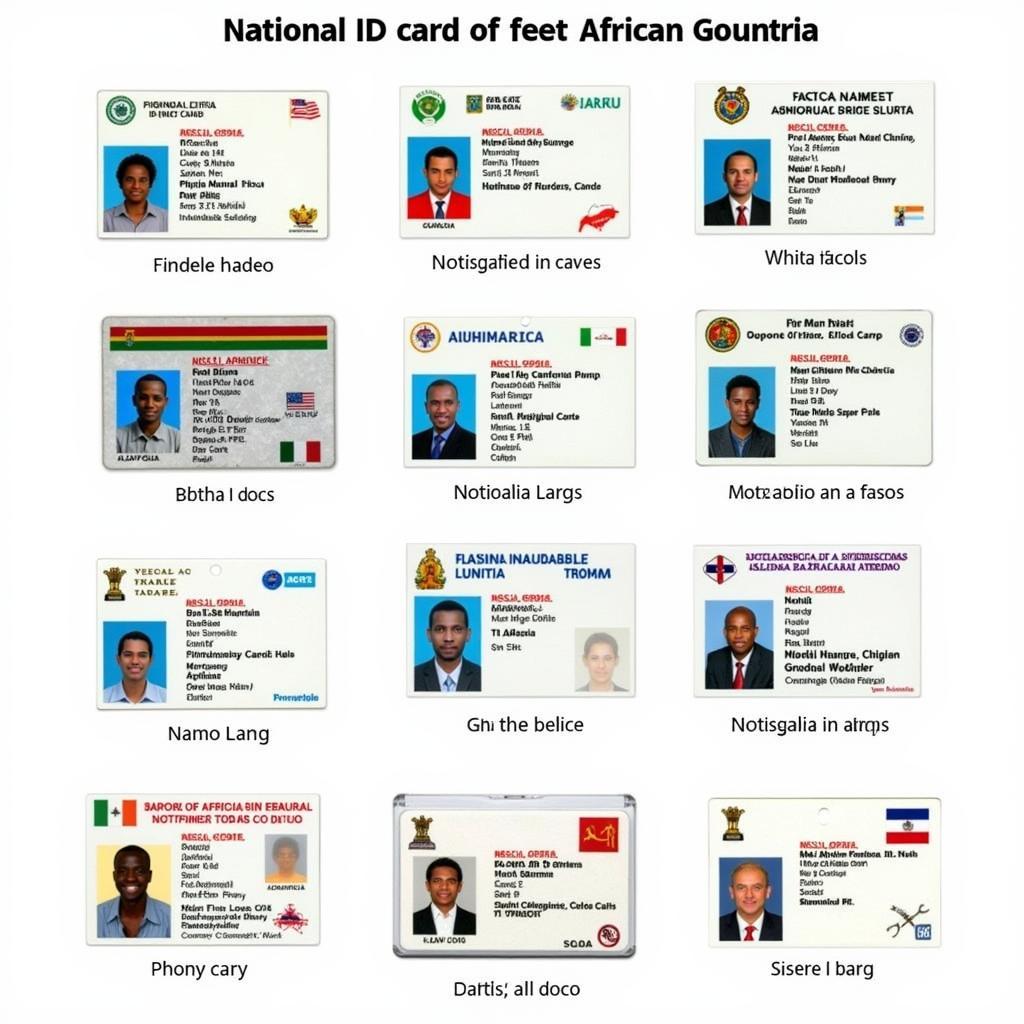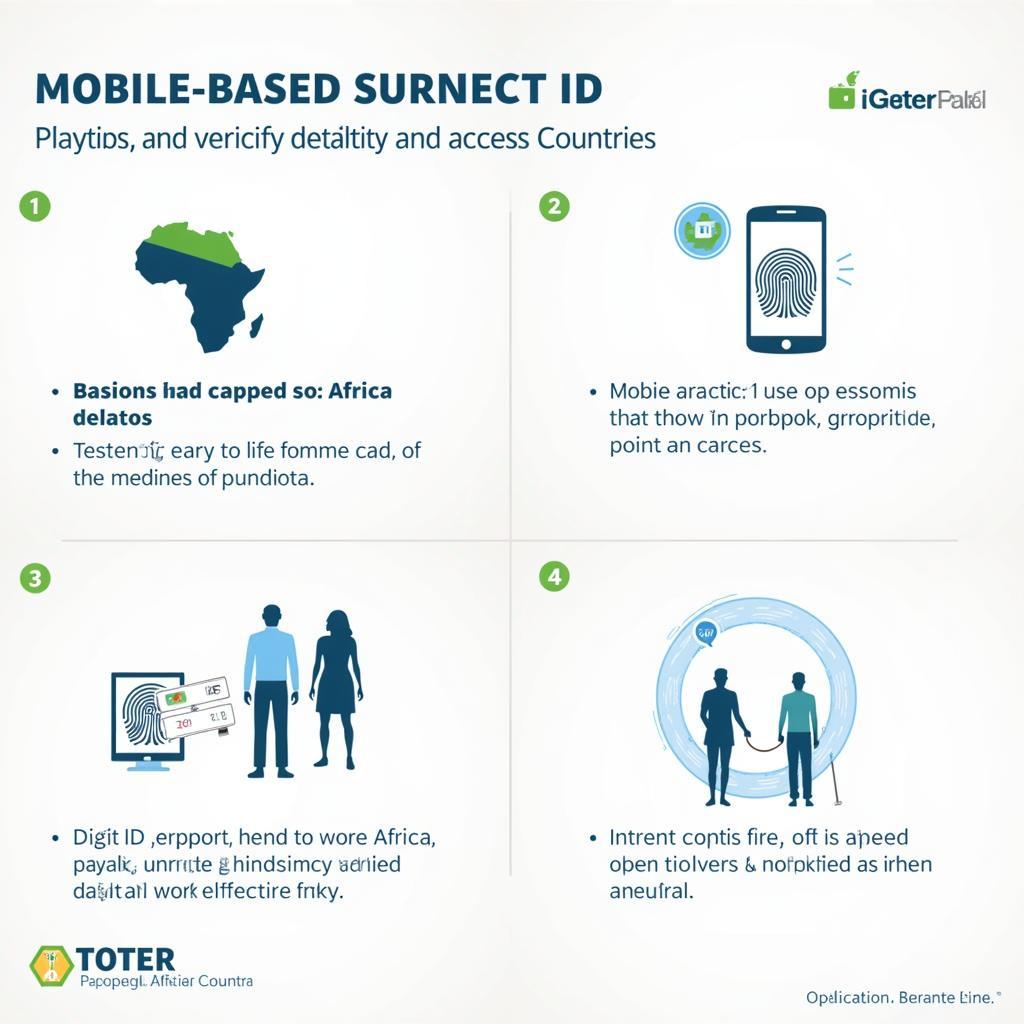Understanding African Identification Cards
African identification cards are essential documents providing proof of identity and citizenship across the diverse nations of the continent. These cards play a crucial role in accessing vital services, exercising rights, and facilitating various transactions in daily life. From national ID cards to voter registration cards and even community-specific identifications, understanding the landscape of African identification cards is key to navigating the continent’s bureaucratic and social structures.
The Significance of African Identification Cards in Daily Life
Identification cards in Africa are more than just pieces of plastic; they are gateways to essential services and opportunities. Having a valid ID card is often a prerequisite for accessing healthcare, education, financial services, and even employment. They are also critical for voting, traveling within and outside the country, and participating fully in civic life. For many, an ID card represents inclusion and access to the formal economy, ensuring basic rights and protections.
Imagine trying to open a bank account, register a business, or even receive medical treatment without proper identification. In many African countries, these activities become incredibly challenging, if not impossible, without a recognized ID card. Therefore, these cards empower individuals, enabling them to participate fully in society and access essential services.
 Examples of African National ID Cards
Examples of African National ID Cards
Navigating the Diverse Landscape of African ID Cards
The types of identification cards available across Africa are as diverse as the continent itself. While national ID cards are the most common, various other forms of identification exist, each serving a specific purpose. These can include voter registration cards, driver’s licenses, refugee identification documents, and even community-issued IDs for specific regions or ethnic groups. The specific requirements and procedures for obtaining these cards vary significantly from country to country, reflecting the unique legal and administrative systems in place.
For instance, some countries have adopted biometric technology, incorporating fingerprints or facial recognition into their ID systems, while others rely on more traditional methods. Understanding these differences is crucial for anyone navigating the complexities of African identification systems.
What Are the Challenges and Opportunities Surrounding African Identification Cards?
Despite their importance, African identification card systems face several challenges. These include limited access to technology and infrastructure, especially in remote areas, making it difficult for some individuals to obtain or replace lost cards. Issues of data security, privacy, and the potential for fraud also need careful consideration. Moreover, the lack of standardization across countries can create difficulties for cross-border movement and regional integration.
However, these challenges also present opportunities for innovation. Mobile technology and digital identity solutions are emerging as potential game-changers, offering accessible and secure identification platforms. These advancements can streamline processes, reduce costs, and improve the overall efficiency of identification systems.
 Emerging Digital ID Solutions in Africa
Emerging Digital ID Solutions in Africa
The Future of African Identification Cards: Towards Digital Inclusion
The future of African identification cards is likely to be increasingly digital. With the growing penetration of mobile phones and internet access, digital identity solutions are poised to transform how individuals are identified and verified. This shift towards digital inclusion has the potential to empower marginalized communities, improve service delivery, and contribute to economic growth across the continent.
“Digital ID systems offer a transformative opportunity for Africa,” says Dr. Abena Kwesi, a leading expert on African governance and technology. “By leveraging technology, we can create more inclusive and efficient identification systems that empower individuals and drive development.”
Conclusion
African identification cards are pivotal for access, inclusion, and participation in society. While challenges remain, the ongoing evolution of these systems, particularly towards digital solutions, holds immense potential for positive change. Understanding the complexities and nuances of African identification cards is crucial for anyone seeking to engage with the continent, whether for business, travel, or research. By embracing innovation and addressing existing challenges, African nations can leverage identification systems to empower their citizens and build a more inclusive and prosperous future. Remember, having a proper understanding of African identification cards unlocks a deeper understanding of the continent itself.
FAQ
- What are the common types of ID cards in Africa? National ID cards, voter registration cards, driver’s licenses, and community-issued IDs.
- Why are ID cards important in Africa? They provide access to essential services, facilitate transactions, and ensure participation in civic life.
- What are the challenges facing African ID systems? Limited access to technology, data security concerns, and lack of standardization.
- What are the future trends in African identification? The adoption of digital identity solutions and increased use of biometric technology.
- How can I learn more about a specific country’s ID system? Consult the country’s official government website or relevant embassy/consulate.
- What should I do if I lose my ID card in an African country? Report the loss to local authorities and follow the necessary procedures for replacement.
- Are digital ID cards accepted everywhere in Africa? Acceptance varies depending on the country and the specific service provider.
Situations where ID cards are frequently required:
- Opening a bank account
- Registering a business
- Voting in elections
- Accessing healthcare services
- Enrolling in educational institutions
- Traveling within and outside the country
- Applying for government benefits
- Obtaining a driver’s license
Related Articles You Might Find Interesting:
- The Impact of Digital Technology on African Governance
- Understanding African Electoral Systems
- Accessing Healthcare in Sub-Saharan Africa
For any assistance regarding African identification cards or related inquiries, please contact us: Phone: +255768904061, Email: kaka.mag@gmail.com or visit us at: Mbarali DC Mawindi, Kangaga, Tanzania. We have a 24/7 customer support team available to help you.



